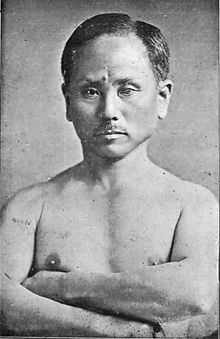Gichin Funakoshi
|
Jichin Funakoshi 船越 義珍 Funakoshi Gichin |
|
|---|---|

Gichin Funakoshi, c. 1955
|
|
| Born |
November 10, 1868 Shuri, Ryūkyū Kingdom |
| Died | April 26, 1957 (aged 88) Tokyo, Japan |
| Native name | 船越 義珍 Funakoshi Gichin |
| Other names | Shoto (waving pines) |
| Style | Shōrei-ryū, Shōrin-ryū, and Shotokan Karate |
| Teacher(s) | Ankō Asato, Ankō Itosu, Matsumura Sōkon |
| Rank | 5th dan, 10th dan (postmortem) |
| Notable students | Hironori Ōtsuka, Gigō Funakoshi (his son), Isao Obata, Shigeru Egami, Teruyuki Okazaki, Tetsuhiko Asai, Masatoshi Nakayama, Yasuhiro Konishi, Hidetaka Nishiyama, Tsutomu Ohshima, Taiji Kase, Mitsusuke Harada, Hirokazu Kanazawa, Won Kuk Lee, Masutatsu Oyama, Tetsuji Murakami, Yutaka Yaguchi, Won Kuk Lee, Byung Jik Ro, Choi Hong Hi |
Gichin Funakoshi (船越 義珍 Funakoshi Gichin?, November 10, 1868 – April 26, 1957) is the founder of Shotokan Karate-Do, perhaps the most widely known style of karate, and is attributed as being the "father of modern karate". Following the teachings of Anko Itosu and Anko Asato, he was one of the Okinawan karate masters who introduced karate to the Japanese mainland in 1922. He taught karate at various Japanese universities and became honorary head of the Japan Karate Association upon its establishment in 1949.
Gichin Funakoshi was born on November 10, 1868 (refer to Karate-dō, My Way of Life by Gichin Funakoshi), the year of the Meiji Restoration, in Shuri, Okinawa, to a low-rank Ryūkyūan Pechin and originally had the family name Tominakoshi. Funakoshi was born prematurely. His father's name was Gisu. After entering primary school he became close friends with the son of Ankō Azato, a karate and Jigen-ryū master who would soon become his first karate teacher. − Funakoshi's family was stiffly opposed to the abolition of the Japanese topknot, and this meant he would be ineligible to pursue his goal of attending medical school, despite having passed the entrance examination. Being trained in both classical Chinese and Japanese philosophies and teachings, Funakoshi became an assistant teacher in Okinawa. During this time, his relations with the Azato family grew and he began nightly travels to the Azato family residence to receive karate instruction from Ankō Azato.
Funakoshi had trained in both of the popular styles of Okinawan karate of the time: Shōrei-ryū and Shōrin-ryū. Shotokan is named after Funakoshi's pen name, Shōtō, which means "waving pines". Kan means training hall, or house, thus Shōtōkan referred to the "house of Shōtō". This name was coined by Funakoshi's students when they posted a sign above the entrance of the hall at which Funakoshi taught reading "Shōtō kan". In addition to being a karate master, Funakoshi was an avid poet and philosopher who would reportedly go for long walks in the forest where he would meditate and write his poetry.
...
Wikipedia
